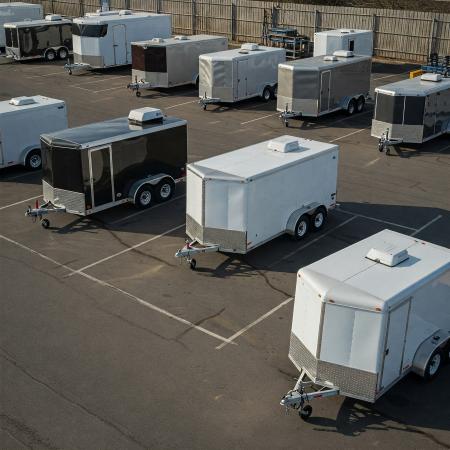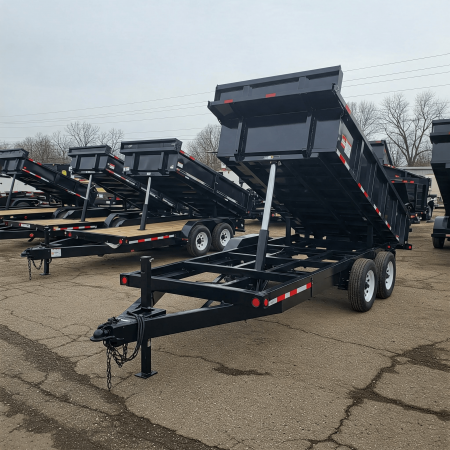When it comes to hauling cargo, choosing between an enclosed trailer and an open trailer is a crucial decision. Each type offers unique benefits and drawbacks depending on your specific needs. Whether you're transporting equipment, vehicles, or personal belongings, understanding the differences between these two trailer types will help you make an informed choice.
Understanding Enclosed Trailers
Enclosed trailers are fully covered units that provide complete protection for your cargo. They are available in various sizes and configurations, making them ideal for individuals and businesses that require secure and weather-resistant transportation.
Benefits of Enclosed Trailers
-
Weather Protection – Enclosed trailers shield your cargo from harsh weather conditions, such as rain, snow, and intense sun, ensuring that your items remain in excellent condition.
-
Security – With a lockable design, enclosed trailers provide enhanced security against theft and unauthorized access, making them perfect for transporting valuable goods.
-
Versatility – These trailers can be customized with shelves, ramps, climate control, and other features to accommodate different types of cargo, from motorcycles to business inventory.
-
Increased Resale Value – Due to their durability and security features, enclosed trailers tend to retain their value longer than open trailers, making them a wise investment.
-
Branding Opportunities – Many businesses use enclosed trailers for advertising by adding custom decals and logos to the exterior.
Drawbacks of Enclosed Trailers
-
Higher Cost – Enclosed trailers are generally more expensive than open trailers due to their enhanced features and protective design.
-
Increased Weight – These trailers are heavier, which can reduce fuel efficiency and require a more powerful towing vehicle.
-
Limited Accessibility – Unlike open trailers, accessing cargo inside an enclosed trailer can be more challenging, especially for frequent loading and unloading.
Understanding Open Trailers
Open trailers are flatbed or utility trailers without walls or a roof. They are often used for hauling heavy equipment, landscaping materials, and vehicles.
Benefits of Open Trailers
-
Cost-Effective – Open trailers are generally more affordable than enclosed trailers, making them a budget-friendly option for many users.
-
Lighter Weight – With a lighter frame, open trailers allow for improved fuel efficiency and easier towing with smaller vehicles.
-
Easy Loading and Unloading – Without walls or a roof, open trailers provide quick and convenient access to cargo from all sides, making them ideal for frequent transportation needs.
-
Better Visibility – Since open trailers do not enclose the cargo, drivers have improved visibility, reducing blind spots and making maneuvering easier.
-
Higher Load Capacity – Open trailers can accommodate larger and bulkier loads that may not fit inside an enclosed trailer.
Drawbacks of Open Trailers
-
Exposure to Elements – Since open trailers lack a protective enclosure, cargo is vulnerable to rain, wind, and sun damage.
-
Less Security – Without walls or locks, open trailers are more susceptible to theft, requiring additional measures such as tie-downs and security chains.
-
Limited Customization – Unlike enclosed trailers, open trailers have fewer options for storage modifications and protective features.
Which Trailer is Right for You?
Choosing between an enclosed trailer and an open trailer depends on your specific needs and preferences. Here are some key factors to consider:
-
Cargo Type – If you're transporting valuable, delicate, or weather-sensitive items, an enclosed trailer is the better choice. If you need to haul large or bulky equipment, an open trailer might be more practical.
-
Budget – Open trailers are more affordable, but if security and protection are priorities, investing in an enclosed trailer is worth considering.
-
Frequency of Use – If you frequently load and unload cargo, an open trailer offers easier access, while an enclosed trailer provides better protection for long-term storage and transport.
-
Towing Capacity – Since enclosed trailers are heavier, ensure that your towing vehicle can handle the additional weight before making a decision.
Final Thoughts
Both enclosed and open trailers have their advantages, and the right choice depends on your specific hauling needs. If security and weather protection are top priorities, an enclosed trailer is the way to go. However, if affordability and easy access to cargo are more important, an open trailer will serve you well. At Yucaipa Trailers, we offer a wide range of high-quality trailers to suit every purpose. Visit us today to find the perfect trailer for your needs!












Comments (0)